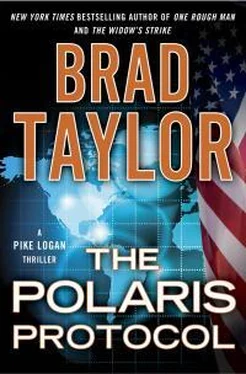After the initial blow-by-blow of the operation, Kurt began explaining why the mission had been executed, and the briefing finally became contentious because of Jennifer’s actions in Mexico. In effect, she’d forced a Prairie Fire alert because of personal reasons, not through an official Taskforce operation. Before it could turn into a feeding frenzy, Kurt had diverted attention by describing what her brother had possibly stumbled upon, which had led to the ongoing conversation about UAVs.
The SECDEF repeated, “Jamming GPS isn’t rocket science. Basically, all you need to do is pump out a stronger signal, but that’s very localized and really only works within a small footprint. In other words, airplanes, tanks, and other things might lose signal, but only for as long as they were in the jamming zone. Seconds in most cases. It’s not catastrophic. Spoofing the signal itself and tricking the UAV to fly somewhere else is much more sophisticated, and not something we’ve seen yet, at least on DOD drones.”
President Warren said, “Just because we haven’t seen it doesn’t mean it isn’t a threat. If the Mexican cartels have managed to find a way to affect GPS—even locally—it could have repercussions worldwide. Especially if it gets in the hands of a peer competitor during wartime, or in the hands of some group looking to harm us in peacetime.”
The SECDEF nodded. “Yes, sir. That’s true, but only if they’ve actually got something. I just don’t see it. Iran has been trying to develop a capability like that for years, and they haven’t gotten anywhere.”
Secretary of State Jonathan Billings said, “But they did get one of our drones.”
“No, they didn’t. We lost that RQ-1 through a glitch. As soon as it lost link with the satellite, it landed like it was supposed to do. As I said, they’ve been trying almost as hard to develop cyber capability as they have to develop a nuke, and they still can’t do anything like that, no matter what their propaganda machine puts out. How could a bunch of drug runners create such a device without any scientific capability whatsoever?”
Kurt said, “The expertise is on our side. They’d do it just like they have in all of the Mexican law enforcement organizations. They’d extort it from the inside. We’re not sure if it’s just UAVs they’re interested in. The man on the tape was talking about the entire GPS constellation.”
The SECDEF bristled. “Well, they’d have an easier time building this magic device from the ground up in Mexico. The constellation is run by the Air Force’s Second Space Operations Squadron, and all of them have ironclad security clearances. It’s not like we let a janitor into the control floor and have him keep an eye on things for a smoke break.”
Kurt held up his hands. “Hey, sir, I’m just saying it’s a method. We had Hansen in the FBI and Ames in the CIA, both with ironclad security clearances. These cartels can bring a hell of a lot more money to bear than the USSR ever could.”
The president said, “It’s worth a look. Check everyone in the squadron. See if anyone has taken leave in the last week, and if so, find out if they were in El Paso.” The SECDEF nodded, and he continued. “I’m more concerned with cyber. Could they get through from the outside?”
“No, sir. The GPS constellation isn’t connected to the Internet. They’d have to be on Schriever itself. Affecting a single UAV is one thing, but the backbone architecture of the entire constellation is a different story altogether. I don’t see that as a realistic threat.”
President Warren ran down the rabbit hole, saying, “If it did happen, what’s the impact?”
The SECDEF paused. “Really, that’s hard to assess. If they hit the civilian signals alone, we’d have little impact. Theoretically, if they somehow could take out the military signals, we’d lose all precision weapons. We’d be back to dropping dumb bombs. It would also play hell with all of our mounted and dismounted movement, mainly in our logistics. Truthfully, it’s sort of like asking the impact of losing our radios. We take GPS for granted now, like talking on a radio. We could still fight, but it would be much more inefficient.”
Kurt saw Billings’s brow scrunch. He said, “Military signals? You mean they’re different?”
The SECDEF said, “Yes. The military has its own architecture, and it’s encrypted and hardened against jamming. Losing the civilian bands wouldn’t affect our ability to react to contingencies.”
Bill Crosswell, a former four-term congressman with a penchant for political survival, spoke up. Having spent most of his adult life in the trucking business before turning to politics, he’d been tapped by the administration for secretary of transportation. “Mr. President, that’s not exactly accurate. The military is tied to the civilian signal much, much more than they know. It’s true they can drop the bombs, but they might not get the bombs because the civilian industrial base that makes and delivers them is tied into the GPS. Transportation has a hand in the constellation, and I see it every day.”
The president slapped the table with an open hand. “So what’s the damn impact? Can someone give me a straight answer?”
All the men at the table jerked upright at the action, not uttering a word. Eventually, Alexander Palmer, the national security advisor, said, “Sir, bluntly, we honestly don’t know. Because the signal is not licensed or anything like that—because using it only means buying a receiver—we just don’t know how far into our national grid it has gone. For the government, I can tell you that the telecommunications, power, and transportation infrastructure rely on it a great deal. The loss of the precision timing alone would cause significant damage if it went out. As for the private sector—banking and all that—we just don’t know. Big-ticket things like the New York Stock Exchange claim to have atomic-clock backups for the timing signal, but there are a multitude of smaller elements tied into the exchange that don’t.”
President Warren began to scowl and Palmer backpedaled. “Hey, it’s not something we’ve studied. It’s become so ubiquitous it’s like asking how far the Internet has penetrated. We think of the Internet as watching YouTube, but it has become a backbone for everything from remotely starting your car to turning out the lights in your house. GPS is the same way. We can guess, but we really just don’t know. GPS is just too good to not use, especially since it’s free.” He pointed at the secretary of defense. “In the end, Mark’s right. It is a bunch of drug runners, something I don’t feel is a realistic threat.”
“Unless the assholes actually do have something and sell whatever it is to someone else.” President Warren saw the D/CIA snap up his eyes at the comment and said, “What?”
The D/CIA spoke up. “Sir … we’ve got movement of a Hezbollah cell from the tri-border region of South America to Mexico City. Coming in two days. It’s probably nothing, and I’m not trying to be an alarmist. We’ve been eyeing them for a while because of the cartel’s penetration of our border, and NSA picked up the intercept last night. I thought it was strictly CIA business, but maybe it’s connected.”
President Warren turned back to Kurt. “What’s the next step? Do you have one?”
“We’ve got the phone trace of the informant in the Sinaloa cartel. That could lead us to Jack, Jennifer’s brother. I have no idea what he knows, but apparently everyone down there thinks it’s critical. We could at least get some intelligence to flesh out the threat. If there is one.”
“Really? That’s it?”
Kurt paused for a moment, the statement aggravating him. “Yes, sir. That’s it. I have the ability to rescue an American being held by the drug cartels because they think he has knowledge of a threat against American interests. That’s all I have.”
Читать дальше












